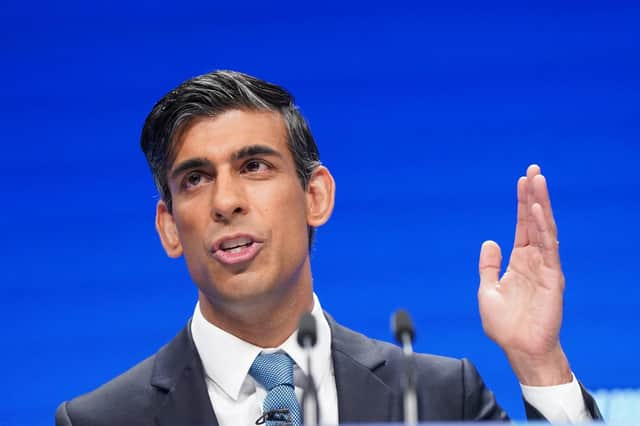UK economy was showing signs of upturn before Omicron hit


During the month, gross domestic product (GDP) - a measure of all goods and services that were produced - rose by 0.9 per cent.
It was considerably ahead of the 0.4 per cent that had been predicted by analysts, according to an average compiled by Pantheon Macroeconomics.
Advertisement
Hide AdAdvertisement
Hide AdThe surge pushed GDP back above its pre-pandemic levels for the first time, the Office for National Statistics said.
Officials at the ONS reported that the construction sector grew strongly during November, with the services and production sectors also benefiting.
The measure is currently 0.7 per cent ahead of where it was in February 2020.
Chancellor Rishi Sunak said the return to pre-pandemic levels was "a testament to the grit and determination of the British people".
Advertisement
Hide AdAdvertisement
Hide AdBut the unseasonably mild weather in November also played its part.
The construction sector, which grew at a rapid 3.5 per cent, was able to operate on sites throughout the month due to the dry weather.
Infrastructure businesses saw their output rise 11.4 per cent, while private new housing companies rose 5.5 per cent.
Their strong growth is in part explained by a bounceback from large losses in October, but there is also evidence that supply chain problems eased during the month.
Advertisement
Hide AdAdvertisement
Hide AdONS chief economist Grant Fitzner said: "The economy grew strongly in the month before Omicron struck, with architects, retailers, couriers and accountants having a bumper month.
"Construction also recovered from several weak months as many raw materials became easier to get hold of.
"This meant that monthly GDP exceeded its pre-pandemic level for the first time in November."
The economic impact of the fight against Covid-19 was also evident in the data.
Advertisement
Hide AdAdvertisement
Hide AdOutput from the vaccination programme increased 40 per cent as boosters were rolled out, which helped contribute 0.2 percentage points to GDP, together with NHS Test and Trace.
In England there were 7.6 million vaccinations in October, and 10.3 million in November.
But the figures do not take into account the weight that Omicron might have put on the economy in the last month and a half.
The first cases of the variant were only discovered in the UK at the end of November, so it is unlikely to have had any impact on the data.
Advertisement
Hide AdAdvertisement
Hide AdConfederation of British Industry lead economist Alpesh Paleja said: "While it's good that economic growth picked up in November, the data has been overtaken by events.
"Activity is very likely to have taken a hit in December, as the spread of the Omicron variant and subsequent restrictions disrupted operations in certain sectors.
"As we kick off the new year, the near-term outlook is also clouded by additional challenges: shortages of labour - exacerbated by sickness absence, supply chain disruption and a cost of living crunch for households."
The ONS also revised October's growth from 0.1 per cent to 0.2 per cent.
Advertisement
Hide AdAdvertisement
Hide AdSamuel Tombs, chief UK economist at Pantheon Macroeconomics, said that the data shows "decent progress likely undone subsequently by Omicron".
He pointed out that more people returning to work had helped spur the transport and storage sector to 3.8 per cent growth.
But, he warned: "GDP almost certainly dropped in December, as households hunkered down in response to the Omicron variant.
"A range of near real-time indicators - such as restaurant diner numbers, transport usage, online search data and cinema revenues - point to a pullback in consumer services expenditure. Omicron also depressed labour supply."
Advertisement
Hide AdAdvertisement
Hide AdMr Tombs predicted that next month's figures will show that GDP dropped 0.6 per cent in December, and a further 0.3% in January before a rise in February.
Other experts warned, however, that growth will slow in 2022, because it will no longer be able to rely on a post-Covid bounceback.
Separate trade figures released by the officials showed that imports into the UK rose 4.9 per cent to £42.7bn while exports dropped 1 per cent to £27bn.
Imports from EU countries were lower than those from the rest of the world for the 11th month in a row, and the gap between the two widened to its largest amount of the year.
This gap was mainly driven by fuel imports, the ONS said.
---
Support The Yorkshire Post and become a subscriber today.
Advertisement
Hide AdAdvertisement
Hide AdYour subscription will help us to continue to bring quality news to the people of Yorkshire. In return, you'll see fewer ads on site, get free access to our app and receive exclusive members-only offers.
So, please - if you can - pay for our work. Just £5 per month is the starting point. If you think that which we are trying to achieve is worth more, you can pay us what you think we are worth. By doing so, you will be investing in something that is becoming increasingly rare. Independent journalism that cares less about right and left and more about right and wrong. Journalism you can trust.
Thank you
James Mitchinson